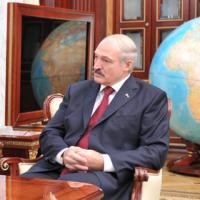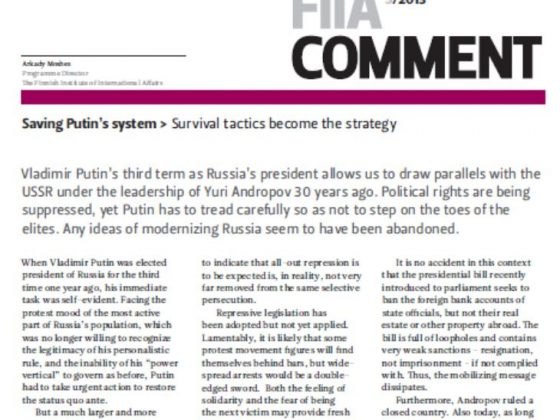It seems that German diplomacy found a new role to play in Eastern Europe – assisting housing and labor market reforms in Belarus. Incomprehensible housing tariffs, legal imperfections, unprotected consumer rights, excessive red-tape regulations – all these mundane issues were discussed at a two-day conference (“European Dialogue on Modernization with Belarusian Society”) convened by the German Foreign Ministry.
Evidently, Belarus is a hard case where traditional mechanisms of EU’s neighborhood policies fail to work. This explains why Germany, which is eager to play a role as a key EU member state, wishes to take a lead in developing new approaches to Minsk, which – quite comfortably, by the way – finds itself isolated from the EU and its European Neighborhood Policy.
EU Commissioner on enlargement, Stefan Füle, in his address, emphasized the political conditions the EU stands for: “We won’t compromise on the indispensability of civil society participation in any dialogue with Belarus. We also insist on the release of political prisoners. It is regrettable that the authorities in Minsk feel threatened by the plurality of opinions within their own country.” In fact, this was the only political statement at this conference dominated by much more technical issues.
Of course, Antje Leendertse (Federal Foreign Office special envoy for Eastern Europe, Central Asia and the Caucasus) assured everyone that “we do exactly what the EU does.” But when one of the participants mentioned that Germany, which had a tradition of conducting a dialogue with the USSR even during the Cold War, nowadays should be ahead of the EU, the audience started applauding.
Germany, preparing for a stronger role within the EU, tries different options in its Ostpolitik. Since it is impossible to have a political dialogue because of EU sanctions, why not try technical venues (like transfer of expertise)? Berlin wants to frame the agenda for transformation in neighboring countries, and believes that the regime in Belarus is on the brink of recognizing the need for reforms. German speakers referred to the parallels with the German Democratic Republic, which failed because of the lack of developmental perspectives and procrastination with overdue reforms. Perhaps some Germans think well ahead, having in mind the presidential election scheduled in Belarus for 2015.
German expectations were sustained by Alexander Chubrik (director of the Institute of Privatization and Management in Minsk) who suggested that the government in Belarus is not a unified bloc, and there are people within it who are quite open to a dialogue with international financial institutions. He said, “We didn’t call to change regime, but we propose technical solutions to everyday problems – banking accounts insurance, taxation, climate change, etc.”
Of course, there is nothing wrong with maintaining a certain dialogue with NGOs operating under the authoritarian regime and expecting that the government will join it. Perhaps, the Belarusians were happy to discuss in Berlin what is wrong with their utilities bills and how to explain to babushkas the advantages of communal reforms, but what can the Germans do about all this? The conference clearly unveiled the most vulnerable points in Germany’s Ostpolitik.
First, there is a need for conceptual clarity. It makes sense to distinguish between the launch of a fully-fledged modernization partnership and non-binding discussions on how to make life better.
Second, as Elena Tonkacheva (from the legal center “Lawtrend”) made clear, there are no channels of communication between the government and the opposition in Belarus. “There is no local self-government in my country – we can’t develop what does not exist. The government is not interested in launching something what can become detrimental for its power. The regime only might be taking some practical advantages from the German projects.”
Third, Germany has already had an experience of initiating a modernization dialogue with Russia, which nowadays is more dead than alive. Shouldn’t this experience be a subject of deep analysis before engaging in another modernization project? The Modernization Partnership with Moscow clearly elucidates the key point: for an authoritarian regime, modernization only makes sense if it is reduced to technical issues and is conducive to getting better access to Western technologies, without changing the functioning of an unreformed state apparatus. Germany’s efforts to launch a modernization dialogue with Belarus will inevitably face the same constraint. The very fact that Minsk is eager to mold the EU–Belarusian modernization dialogue along the lines of the moribund EU–Russian Partnership for Modernization is very much illustrative of the true intentions of the Lukashenko regime.
Fourth, the very tone of the discourse that dominated at the Berlin conference seems to legitimize and sustain Belarusian officialdom. Here are just a couple of the most striking examples from the discussion: “We ought to find something to evoke some interest from the regime of Lukashenko”, “Shouldn’t we have to think about offering a beneficial deal to him?”, “We need to prove that it is in the interests of the ruling elite to conduct reforms.”
These utterances only legitimize the Lukashenko rule. This is exactly what the Belarusian dictator wants – you Germans try to contrive something for convincing me that you are worth of being taken seriously.
The intentional reduction of the concept of modernization to technical services provided for porches and courtyards is also a strong concession to the Lukashenko discourse. Instead of raising issues of rampant corruption in housing market, a couple of dozen of discussants preferred to engage themselves in endless conversations on how hard it is to reform the housing sector.
Major German corporations, which strongly influence German foreign policy, consistently do their best to avoid letting political issues unfold. Berlin officials need only some kind of symbolic interaction with Belarus to show that against the backdrop of EU inaction, Germany does have a policy. Even if modernization is impossible, a dialogue on modernization looks like a compromise option for all parties. Yet wishful thinking ends up playing by Minsk’s rules. Perhaps Belarus is not that important to Germany to start a policy that can irritate both Lukashenko and Putin.
Andrey Makarychev is a Guest Professor at the Free University of Berlin, blogging for PONARS Eurasia on the Russia-EU neighborhood.











